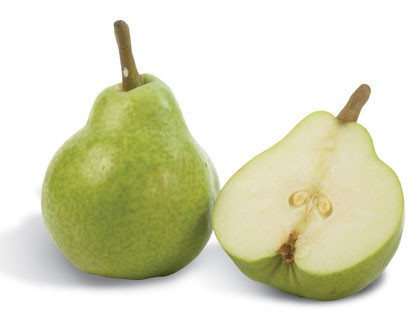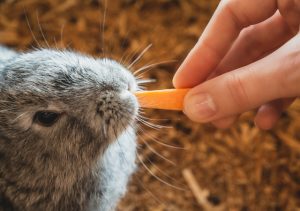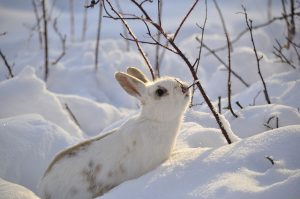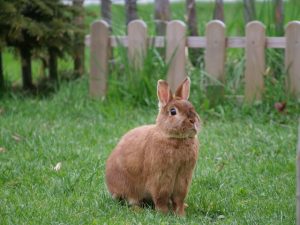Can rabbits eat pears?
Yes, rabbits are allowed to eat 1-2 teaspoons of pears per 2 pounds of body weight. They should not eat them in large quantities because they are very high in sugar. Fruits can lead to serious health problems, so avoid feeding him pears or other fruits on a daily basis. The ideal frequency would be 3, 4 times a week or even less if you feed pellets or vegetables.
They like fruits because they are sweet and rabbits are, in general, big fans of the sweet taste. Fruits can also be found in their natural environment but they are not eating them on a regular basis. In the wild, that is a very difficult thing to do.
An apple a day (in this case a pear a day) does not keep the doctor away when it comes to rabbits. Actually, it's the opposite. Feeding your rabbit more than 2 little pieces of pear flesh per day may lead to weight gain, diarrhea, GI stasis, or bladder problems.
Pellet issue when feeding pears or other fruits
On the days you're feeding treats avoid feeding pellets. They are too much for your rabbit. Also, make sure you feed your bunny only high fiber pellets.
Feeding vegetables vs feeding fruits
Vegetables are better than fruits because they are more nutritious and they have less sugar than fruits. Feed a few fresh vegetables as well when feeding fruits.
Let's talk about pear skin, twigs, and seeds, or about cooked or dried pears? Are they all safe for rabbits?
1. Can rabbits eat pear skins?
Rabbits can eat pear skins, as they can do with apples or melons. Always remember to wash the skin, even if you use organic fruits only. Remove the skins if you are not sure about the pesticides.
2. Can rabbits eat pear twigs?
Are pear tree leaves and branches ok for your rabbit? Yes, they are. The wood and leaves from the trees that have fruits with pits like peach, apricot, plum, cherry are bad and should be avoided unless the wood is completely dry. Also, always remove the sap. The wood from the trees with fruits that have multiple seeds (apple, pear, grape vines) is ok to use even when they are green.
3. Are pear seeds bad for rabbits?
Pear fruits are ok but the seeds do contain cyanide (cyanide we can also find in apples seeds). It's best not to let any pet have the seeds or stems. If that happens once do not worry! It's the habit that is harmful not the one-time mistake.
4. Are cooked pears good for rabbits?
Cooked fruits are never good for rabbits. They contain bigger quantities of sugar that are really bad for rabbits. Even more, the cooking is destroying the fibers from the fruits.
5. Can rabbits eat dried pears/fruits?
If you want to give your rabbit dried fruits, limit drastically the amount. 2 dried raisins per portion (or other fruits in the same amount) are enough for your little bunny. Dried fruits contain about 3 times more sugar than the fresh fruit. Fresh is better and rabbits prefer them too.
Reasons to feed fresh fruits as treats
The standard rabbit diet of hay and a few pellets/a few vegetables can seem harsh but your rabbit can live very well on it. There are some good reasons to add some flavor to your rabbit's diet, though. But remember that you can always return to the simple diet if you see any behavioral changes.
- A variety of foods meet their nutritional needs but don't go overboard. Always respect the small portions even though it may seem so restricted. Rabbits are very little animals and they don't need the same quantities as we do.
- Watch him getting excited when waiting or feeding their treats. It releases happy hormones.
- An amazing training tool to help him learn new stuff.
- A great bonding activity.
- Fruits are good but leafy greens are actually better.
- Fresh fruits are always a better alternative to processed treats.
- Use fruits as a way to determine health status.
- To make treat time even more exciting, you can also offer a small piece of fruit mixed with his favorite vegetable, or type of hay.
- To determine him to eat hay, mix it with little pieces of fruits and vegetables.
- Besides fruits, you can consider using herbs as a treat. Mint is a great choice.
Feeding fruits is a good thing, but your duty is also to stop your rabbit from eating too much fruit.
Not for everyday feeding!
Since pears are so sweet, rabbits like them better than hay or vegetables. When fruits are too frequent your dear rabbit might start to refuse other foods. In this case, try to offer their treats 2, 3 times a week, maximum.
Introduce them slowly!
Firstly, make sure to accustomed your rabbit to his basic diet. Don’t introduce more than one type of fruit at a time. Your rabbit’s digestive tract is very sensitive and too many new foods at a time can easily hurt it. Same rule for veggies. Give your rabbit time to adapt. Wait for 24 hours to see his returning answer.
If your rabbit shows signs of soft stool or an upset tummy, then stop feeding the treats, and offer only hay and a few leafy greens. If everything is fine you can feed him again in a week or so. Change his fruits often.
What fruit can rabbits eat?
You can safely offer your rabbit the following fruits:
Apples and pears (without stems or seeds because they are poisonous), bananas and grapes (sparingly because they are very sweet), orange (including peel), melons, mango, papaya, pineapple (without the skin). Berries such as blackberries, blueberries, raspberries, and strawberries are good. Cherries, peaches or plums only the fleshy part of the fruit. The leaves, wood or pits from these trees contain cyanide and they are very poisonous. Always avoid them.
A good fruit for rabbits is pineapple. It's recommended for getting rid or preventing hairball formation.
Use grapes and bananas only as occasional treats. These two fruits are higher in sugars compared to other fruits. They could easily damage your rabbit’s GI tract if not offered in moderation. If you have offered a larger portion of fruit, then consider not offering fruit for at least 4 days.
So, can bunnies eat pears?
Yes, but just be sure, when feeding pears, do it sparingly. A few slices, the size of 2 grapes is the largest amount your rabbit needs. He should always have water in his bowl and hay in his hay rack near the litter box. He likes to nibble on it while doing his thing. Remember all these and your rabbit will live a happy and healthy life.






